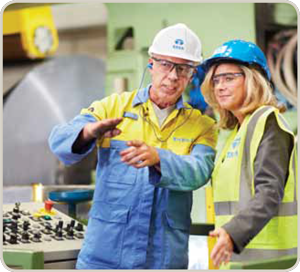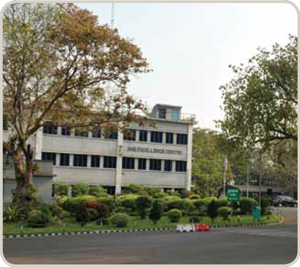

Focussing on employee well-being, Tata Steel Europe 
Committed to environment conservation, Jamshedpur, India |
ADHERENCE TO THE PRINCIPLES OF NATIONAL VOLUNTARY GUIDELINES
The Tata ethos, Company vision and goals serve as guiding philosophies for Tata Steel Limited, with the Tata Code of Conduct acting as its ethical roadmap. In Financial Year 2013-14, an Apex Ethics Committee was formed to provide guidance on Management of Business Ethics (MBE) as well as on related policies. In addition, an Ethics Committee, comprising all Vice Presidents, was constituted to ensure uniformity in consequence management A fully integrated steel producer, Tata Steel's raw material beneficiation, mine yield and mine-life extension strategies strive for long-term sustainability by optimally utilising natural resources. For example, a Life Cycle Assessment model for the production phases of the rebar life cycle has been developed to identify opportunities to conserve resources. Tata Steel's strategic development programme in Europe aims to unlock the potential of steel by focussing on step change improvements in materials properties to develop a new generation of products leading to lighter and safer cars. The Company plays a vital role in the Singapore economy by recycling almost half of the locally generated metal scrap after the end of a product's life back into reinforcement steel for local consumption. The health and safety of its employees across all geographies is a priority for the Company. A health and safety management system is being implemented with cross-auditing activity across regions. Safety and skill development training was imparted to 65.47% of the employees. Tata Steel Europe has established a people-development programme to foster the highest standards of professional and technical expertise, maintaining its competitive advantage. In the Indian states where Tata Steel operates, the Company endeavours to mainstream disadvantaged and marginalised communities through structured and planned Affirmative Action programmes. The emphasis of NatSteel's Corporate Social Responsibility programme, “Building Beyond Borders”, is on education and elderly-care to support the community in a sustainable manner. In Financial Year 2013-14, disbursements amounting to S$76, 050 were presented to 97 students with physical disabilities or those whose parents have physical disabilities. In Financial Year 2013-14, Tata Steel, which has several operating units certified to SA 8000, adopted a structured approach towards evaluating and disclosing information related to assessment of significant business partners. It also introduced human rights screening of partners supporting the outbound logistics function, a high-risk area. Tata Steel is committed to further optimising its resource and energy efficiency. In Financial Year 2013-14, NatSteel's steelmaking operations, one of the most energy efficient in the world, set the global benchmark for energy efficiency, with a carbon footprint of 0.49 tonne of CO2 per tonne of steel produced. The Company's European operations, guided by its energy governance mechanism, introduced a new approach when purchasing equipment such as lighting and motors. The quality of this work has been recognised by the UK Carbon Trust as a best practice for major companies in the UK. In Financial Year 2013-14, the blast furnace burden at Tata Steel's facilities in India comprised up to 45% pellets – the first such regime in large blast furnaces in the country – and amongst few worldwide. NatSteel Holdings and Tata Steel Thailand are certified to the international environmental management standard (ISO 14001) and in the case of NatSteel, to the international energy management standard (ISO 50001). Tata Steel's “Foundation Industries” campaign in the UK was launched at the top of The Shard, Western Europe's largest building, with the UK Business Secretary Vince Cable MP and Dr. Karl-Ulrich Koehler, Tata Steel's European Chief Executive. A report commissioned by Tata Steel demonstrated the economic value foundation industries like steel contribute to the UK, providing almost 5,00,000 jobs and responsible for 30% of the country's exports. In India, the Company partnered industry bodies and organisations like TERI, CII, FICCI and FIMI to lobby and advocate in the larger interest of the sector and the society. Tata Steel's mission is to improve the quality of life of the communities it serves. The Company's direct contribution to community development in the Financial Year 2013-14 was Rs.212 crores, which is 3.31% of the Company's PAT. Tata Steel Europe strives to enrich its local communities and contribute to their future economic and social well-being. During Financial Year 2013-14, 1.5 million people in India and nearly 80,000 people in the UK and mainland Europe benefitted from the community programmes of Tata Steel group. Tata Steel Thailand's “Grow Smart with Tata Steel” book corners reached out to 179 schools across Thailand in Financial Year 2013-14. Tata Steel's stakeholder engagement processes help identify the ecological and social impacts arising out of the value chain for the products/services of the organisation, in addition to assessing and improving customer and consumer awareness on products properties, safe applications and disposal. Tata Steel provides value to key customers through Customer Value Management initiative. |


